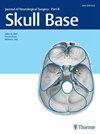Induction Chemotherapy for Sinonasal Tumors in Patients Presenting with Brain Invasion and/or Neurological Deficits
IF 0.9
4区 医学
Q3 Medicine
引用次数: 0
Abstract
Abstract Objective The aim of this study was to investigate the safety of induction chemotherapy (IC) for patients with sinonasal malignancies with brain invasion or a neurological deficit. Methods We conducted a retrospective analysis of patients who underwent IC for sinonasal malignancies with intracranial invasion or a neurological deficit at a single tertiary cancer center from 1992 to 2020. Results In total, 460 patients with sinonasal malignancies were included in the study. Of the patients reviewed, 341 underwent IC and within this group 40 had brain invasion (BI) and 31 had a neurological deficit (ND) at presentation. The most prevalent malignancy was sinonasal undifferentiated carcinoma (BI 40%, ND 41.9%), followed by esthesioneuroblastoma (BI 27.5%, ND 9.7%). All tumors were stage T4 with the majority lacking nodal metastases (BI N0: 72.5%, ND N0: 77.5%). All patients completed at least two cycles of IC. Partial or complete response to IC was seen in 80% of BI and 71% of ND patients. No patients had cessation of treatment due to neurologic decline and none required urgent surgery. Five patients (12.5%) with BI and 2 (6.5%) with ND had interruption of IC for reasons other than neurological decline. In patients with ND, IC led to improvement of 54.5% NDs. Conclusion In patients with sinonasal malignancies with BI or ND who underwent IC, no patients had cessation of treatment due to neurologic decline. In contrast, most patients had improvement of neurologic symptoms with IC. IC was safely administered without interruption due to neurological decline or symptom progression.有脑侵犯和/或神经功能缺损的鼻窦肿瘤的诱导化疗
摘要目的探讨鼻窦恶性肿瘤伴脑侵犯或神经功能缺损患者诱导化疗(IC)的安全性。方法回顾性分析1992年至2020年在单一三级肿瘤中心接受颅内出血或神经功能缺损鼻窦恶性肿瘤颅内出血治疗的患者。结果共纳入460例鼻窦恶性肿瘤患者。在回顾的患者中,341例接受了IC,其中40例有脑侵犯(BI), 31例有神经功能缺陷(ND)。最常见的恶性肿瘤是鼻窦未分化癌(BI 40%, ND 41.9%),其次是神经母细胞瘤(BI 27.5%, ND 9.7%)。所有肿瘤均为T4期,大多数无淋巴结转移(BI N0: 72.5%, ND N0: 77.5%)。所有患者都完成了至少两个周期的IC治疗。80%的BI患者和71%的ND患者对IC有部分或完全缓解。没有患者因神经功能下降而停止治疗,也没有患者需要紧急手术。5例BI患者(12.5%)和2例ND患者(6.5%)的IC中断不是由于神经功能下降的原因。在ND患者中,IC改善了54.5%的ND。结论鼻窦恶性肿瘤合并BI或ND行IC治疗的患者,无因神经功能下降而停止治疗的病例。相比之下,大多数患者使用IC后神经系统症状得到改善。由于神经功能下降或症状进展,IC可以安全使用,不会中断。
本文章由计算机程序翻译,如有差异,请以英文原文为准。
求助全文
约1分钟内获得全文
求助全文
来源期刊

Journal of Neurological Surgery Part B: Skull Base
CLINICAL NEUROLOGY-SURGERY
CiteScore
2.20
自引率
0.00%
发文量
516
期刊介绍:
The Journal of Neurological Surgery Part B: Skull Base (JNLS B) is a major publication from the world''s leading publisher in neurosurgery. JNLS B currently serves as the official organ of several national and international neurosurgery and skull base societies.
JNLS B is a peer-reviewed journal publishing original research, review articles, and technical notes covering all aspects of neurological surgery. The focus of JNLS B includes microsurgery as well as the latest minimally invasive techniques, such as stereotactic-guided surgery, endoscopy, and endovascular procedures. JNLS B is devoted to the techniques and procedures of skull base surgery.
 求助内容:
求助内容: 应助结果提醒方式:
应助结果提醒方式:


